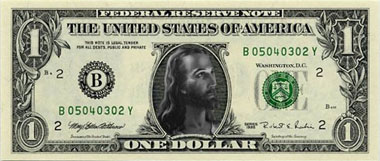
This American Life and Planet Money recently produced an episode titled “The Invention of Money.” You can listen to it here.
The story places the concept of money into the framework of faith, mainly due to the fact that money is no longer a physical object with tangible value like gold. Instead, it is fiction, myth, a number generated on a computer, passing through the internet. With just the push of a button, we’ve got the genesis of currency; something they call in the story “Opening the Fed Window.” The only way this money-myth has value is if people have faith in its value and continue to trust it. Though the money isn’t tangibly real, this faith seems to be very tangible, and it effects the US economy and ultimately the entire world. As Ira says on the show:
Money is fiction. So the answer to the question, where did the money go when the housing market collapsed, turns out to be that the money never existed in the first place. All those houses used to be worth a certain amount and now they were worth a lower amount. Simply because that’s what everyone now agreed. No money changed hands, no money vanished. Same with retirement funds and stock portfolios. Alex says that this is when he realized that nowhere was safe. That there were inflation even sitting in the bank. All his money value could just slowly vaporize. Money is not solid. Its value could disappear. And all these reporters says that after that they would be working on what seemed like perfectly ordinary stories asking straightforward questions and they would bump up against this weird, fictional quality that money has.
This is actually how many perceive Christianity today, as fictional currency that is eventually found to fall flat. When talking with friends who don’t believe, it seems that this is where the conversation ends up. You can debate different ideas and scenarios year after year, but at the end of the day, the irrevocable linchpin is faith. It seems that Jesus is always talking about faith. For many people of faith, their respective “moment(s) of faith” are defining moments in life. And, for Christian believers, it all seems to hinge on who you believe Jesus to be. It is a question Jesus himself asks many times during his ministry: “Who do you say that I am?” C.S. Lewis famously put it like this in Mere Christianity:
“I am trying here to prevent anyone saying the really foolish thing that people often say about Him: “I’m ready to accept Jesus as a great moral teacher, but I don’t accept His claim to be God.” That is the one thing we must not say. A man who said the sort of things Jesus said would not be a great moral teacher. He would either be a lunatic–on a level with the man who says he is a poached egg–or else he would be the Devil of Hell. You must make your choice. Either this man was, and is, the Son of God: or else a madman or something worse. You can shut Him up for a fool, you can spit at Him and kill Him as a demon; or you can fall at His feet and call Him Lord and God. But let us not come with any patronizing nonsense about His being a great human teacher. He has not left that open to us. He did not intend to.”
 The disciples confessed, “You are the Christ, the savior of the world,” and others turned away, or said no, or said I don’t know and walked away sad. The same is true today; faith is a simple word with an amazing (and amazingly polarizing) power. The Bible speaks of faith that has the power to move mountains (Matt 17:20).
The disciples confessed, “You are the Christ, the savior of the world,” and others turned away, or said no, or said I don’t know and walked away sad. The same is true today; faith is a simple word with an amazing (and amazingly polarizing) power. The Bible speaks of faith that has the power to move mountains (Matt 17:20).
Faith is simply believing something is true and putting trust in it. So why does it seem that some are given faith in Christ while others simply aren’t? God only knows, but it doesn’t seem to be from an inability to exercise faith. We all believe. We put faith in many things we don’t see without even thinking twice, like money. For Christianity, it’s not the question of a person having faith, faith is all about its object (namely, Jesus). Faith without an object is ephemeral–it is belief in something that doesn’t exist. We all believe in something–the car starting in the morning, the importance of saving money, gravity–the gift of faith, though, is faith in Jesus Christ.
What if conversations moved from a rootless faith-in-faith, to being about faith in this person? What would change if we admitted we have plenty of faith, we exercise it on a daily basis, and see its results throughout our lives? Wouldn’t the pivotal question, “Is Jesus Christ who he said he was?” stand out? To be sure, it would regularly offend us, because admitting Jesus is Lord, and not Lunatic, consequently means admitting we are sinners urgently in need of help. “I’m independent, I’m a winner,” sounds a lot more practical; nobody wants to confess they can’t fix themselves. If Jesus is Lord, though, the ironic thing is that that’s where freedom begins.
If you enjoy This American Life, then check out This American Gospel, a Mockingbird publication, on Amazon here.

COMMENTS
One response to “Lunatic Faith, Computer Digits, & the Myth of Money”
Leave a Reply















A digit in a computer is money but only if the finger belongs to a private bank backed by law not faith it has been decreed that one group of people in this western world can have the privilege of creating some digits on a screen backed by a borrower’s ability to repay, thus it is the borrower who provides the credit for his banker to punch a few keys in the bank computer that did not exist before the borrower brought his credit to the bank to be monetized. It is a sad fact that this privileged class of bankers will now say they own this credit made available to the borrower who provided the backing and then these bankers will attach interest to the new expansion of digits that did not exist before which will cost the borrower two or three times the loan principle digits that will be canceled out as the “loan” is repaid because they did not exist in reality yet a fat profit has been made by the bank who produced this cost less entering of digits they call money.